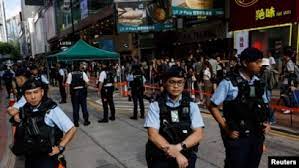William Yang
In a push to prevent public demonstrations in Hong Kong, police and university authorities have stopped students from staging a vigil to commemorate the Umbrella Movement and even arrested a man for holding white flowers in public over the past week. Analysts say the pre-emptive and swift actions by authorities show just how worried they are about the resurgence of any resistance in the city.
“Even though political expressions [in Hong Kong now] are all non-violent and avoid directly shaming the authorities, the Hong Kong government is still very anxious about letting dissenting voices be heard in public or reported by the media,” said Eric Lai, a visiting researcher at the Dickson Poon School of Law at King’s College in London, in a phone interview. On China’s October 1 National Day, a 39-year-old man, known to many in Hong Kong as “Captain America,” was arrested by three police officers for holding white flowers in Hong Kong’s busy Causeway Bay shopping district.
In a video circulating on the social media platform X, formerly known as Twitter, the man was seen wearing a black T-shirt with the text “Hong Kong Add Oil!” – a phrase of encouragement – and holding white flowers, which symbolize death in Chinese culture. He was standing in front of a department store. Three plainclothed police surrounded him and asked him to present his identity card. The man failed to comply and began to swear at the officers, who tackled him to the ground and forced his hands behind his back.
A small group of bystanders could be heard in the background, urging the officers not to hurt the man while emphasizing that offering flowers is not a crime. According to local media reports, police later arrested him for public disorder and obstructing police in the execution of their duties. Hong Kong police did not respond to VOA’s request for comment.
In the past, Hong Kongers have marked China’s National Day by holding public demonstrations and mass marches against the Chinese Communist Party. Protests against the party’s leadership and China’s human rights abuses were common. But since 2020, the COVID-19 pandemic and the national security law (NSL) – which was imposed on the city by China’s National People’s Congress – have prevented Hong Kong residents from engaging in public protests. Some observers say this week’s incidents show that Hong Kong police are adopting methods of repression used by their counterparts in China.
“People will need to have police approval to demonstrate, [and in some cases,] the police will take organizers away and interrogate them,” says Maya Wang, associate Asia director at Human Rights Watch (HRW). She said authorities are essentially preventing people from organizing protests, and there are more examples of individuals being punished for voicing dissent. And while Hong Kong authorities claim they continue to uphold citizens’ basic rights and freedoms, Lai from King’s College says he thinks their actions contradict those claims. “Apart from the arrests and prosecutions of more than 250 people under the NSL, the preemptive measures they have adopted show they don’t respect citizens’ basic rights and freedom protected by the Basic Law, which is the city’s mini-constitution,” he said. Instead, the Hong Kong government puts “the national security law above basic human rights,” Lai says, adding that such practice is contrary to universal human rights standards embedded in the Basic Law.
During the reception marking the 26th anniversary of Hong Kong’s handover to China on July 1, Hong Kong Chief Executive John Lee said the city must stay vigilant against “soft resistance” and be proactive in safeguarding national security. Last Thursday, just days ahead of National Day, three students at Hong Kong Baptist University organized a vigil on campus to commemorate the ninth anniversary of the Umbrella Movement, a 79-day civil disobedience campaign in 2014. According to local media reports, the students wore black t-shirts and stuck slogans such as “Freedom is not free” and yellow ribbons on their shirts. After they had stood silently for 10 minutes, staff from the university took the students away for staging an “unauthorized event.”
In an e-mailed statement to VOA, university officials said they respect and uphold freedom of speech and are committed to creating an environment conducive to teaching, learning and research. “If students or student organizations need to organize activities on campus, they have to apply to the University prior to the events and provide accurate information about the events,” the University wrote. Any violation of the regulations may result in a request to terminate the events or be disciplined by university management. While guidelines about organizing events on university campuses have existed for a long time, Lai from King’s College said university management has been very hostile toward student activists since the NSL came into force in July 2020.
“Before 2020, university management would exercise a high degree of tolerance and respect for student activities on campuses, [hoping] to create a liberal environment,” he told VOA. “But over the past two to three years, university management has less tolerance for students’ campus lives. Some student unions have been forced to disband.” With no clear boundaries on the exercise of basic rights and freedom under the NSL, some analysts say many people in Hong Kong are forced to copy strategies used by mainland Chinese activists to express their opinions. “Nobody knows where the red line is, so it’s difficult for people to know to what extent they can still express their wills,” Patrick Poon, a visiting researcher at the University of Tokyo, told VOA.
To strike a balance between exercising freedom of expression and ensuring their personal safety, Poon says Hong Kongers are becoming as creative as activists in mainland China. “The only possible way for Hong Kong people to share their views is to share them online,” he said. “But they can’t use their real names and they need to use very obscure wording to express their views.”
VOA







